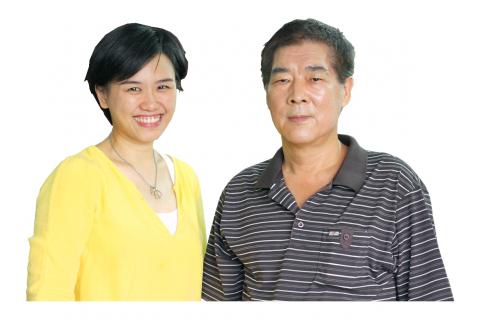When Lu Kuang-mao began an apprenticeship with a shoemaker more than three decades ago, it wasn’t because he was passionate about footwear. “I had to make money and eat,” says Lu, who grew up on a farm.
Since then, Lu has cultivated a reputation as one of Taiwan’s top traditional shoemakers. He estimates he has made tens of thousands of shoes over the course of his career and teaches at the Footwear and Recreation Technology Research Institute.
Hsing-ju Lin makes frequent trips to Lu’s workshop in Greater Taichung, and the two collaborate closely on each of Liebe Hsing’s designs. A new set of plastic lasts (forms in the shape of the foot) is made for each style. Lin carefully checks each new shipment from her leather suppliers, making sure that the animal skins used in her shoes are free from defects or flaws in the dye (sometimes as much as one-third of a hide is unusable). Many Liebe Hsing designs are made with delicate lambskin, which Lu stabilizes with an all-natural adhesive and stitches with thin nylon thread. The body of each shoe is carefully hammered to its sole; some are baked at low heat in an oven to mold the leather.

Photo: Catherine Shu, Taipei Times
Lu estimates that half of his students at the Footwear and Recreation Technology Research Institute hope to become shoe designers, while the other half plan to develop new shoe manufacturing technologies. Though traditional shoemaking skills are still being passed on to the next generation, Lu says small workshops like his are gradually disappearing as their owners retire.
“The construction of shoes is complicated and there are so many steps,” Lu says. “It sometimes takes the same amount of time to make 10 pairs of shoes by hand as it takes a factory to produce 100 pairs.”
For more information and a list of retailers, visit shoesologie.blogspot.com or www.facebook.com/pages/Liebe-Hsing. Liebe Hsing shoes are sold online at www.pinkoi.com/store/liebehsing

As Taiwan’s second most populous city, Taichung looms large in the electoral map. Taiwanese political commentators describe it — along with neighboring Changhua County — as Taiwan’s “swing states” (搖擺州), which is a curious direct borrowing from American election terminology. In the early post-Martial Law era, Taichung was referred to as a “desert of democracy” because while the Democratic Progressive Party (DPP) was winning elections in the north and south, Taichung remained staunchly loyal to the Chinese Nationalist Party (KMT). That changed over time, but in both Changhua and Taichung, the DPP still suffers from a “one-term curse,” with the

William Liu (劉家君) moved to Kaohsiung from Nantou to live with his boyfriend Reg Hong (洪嘉佑). “In Nantou, people do not support gay rights at all and never even talk about it. Living here made me optimistic and made me realize how much I can express myself,” Liu tells the Taipei Times. Hong and his friend Cony Hsieh (謝昀希) are both active in several LGBT groups and organizations in Kaohsiung. They were among the people behind the city’s 16th Pride event in November last year, which gathered over 35,000 people. Along with others, they clearly see Kaohsiung as the nexus of LGBT rights.

Jan. 26 to Feb. 1 Nearly 90 years after it was last recorded, the Basay language was taught in a classroom for the first time in September last year. Over the following three months, students learned its sounds along with the customs and folktales of the Ketagalan people, who once spoke it across northern Taiwan. Although each Ketagalan settlement had its own language, Basay functioned as a common trade language. By the late 19th century, it had largely fallen out of daily use as speakers shifted to Hoklo (commonly known as Taiwanese), surviving only in fragments remembered by the elderly. In

Dissident artist Ai Weiwei’s (艾未未) famous return to the People’s Republic of China (PRC) has been overshadowed by the astonishing news of the latest arrests of senior military figures for “corruption,” but it is an interesting piece of news in its own right, though more for what Ai does not understand than for what he does. Ai simply lacks the reflective understanding that the loneliness and isolation he imagines are “European” are simply the joys of life as an expat. That goes both ways: “I love Taiwan!” say many still wet-behind-the-ears expats here, not realizing what they love is being an